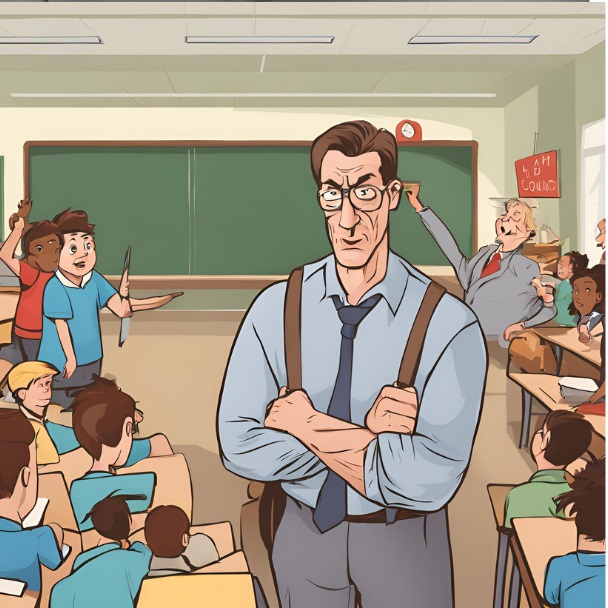- Opinion
- 2 de October de 2024
- No Comment
- 7 minutes read
The defenselessness of the teacher also means that of the student

The defenselessness of the teacher also means that of the student
Teachers face situations of a violent nature on a daily basis


In our current days there are more protocols than ever for improving coexistence in educational centers, the cases of bulling appear more than ever in the media, and we are having an inexhaustible offer of courses and workshops on how to address this phenomenon, but violence in the classroom continues to be a reality.
Actually, since the teacher won’t be recognized as a public authority and the law of hegemonic pedagogy and its unscientific do-goodism keeps prevailing, the teacher will continue to be in a situation of helplessness, actually legal defenselessness, and impotence that will make the assaulted student also find himself in the same state of vulnerability, abandonment and lack of protection.
These rules of do-gooder pedagogy speak of restorative practices and not of punishment, and therefore of impunity, and they lead us to the absurdity that when faced with sexual aggression between students we must place the aggressor and the victim on the same level, get the victim to trivialize and relativize her pain and not only forgive her aggressor, but also understand that he had no other option than to attack her. The victim must accept that she is not the only one who suffers, but that her aggressor suffers too, as much or more than her and that’s why is attacking her. In short, the victim must understand that aggression is a way to express suffering. The victim must convince herself that what is a rape for her it is actually not, but a child’s game. But calling it a game does not diminish the importance of aggression, because as Engels reminds us:
“These gentlemen think that when they have changed the names of things, they have changed the things themselves. This is how these deep thinkers make fun of the whole world.”[i]
At what point did we stop calling things by their name? When did the massive and widespread use of euphemism become imposed to soften reality and protect the bubbles in which we believe to be living in? Why does talking about discipline or punishment turn us into a reactionary demon anchored in old, already extinct values?
When appealing to common sense is appealing to nothing, it is not surprising that hope is the first thing to be lost.
One of the consequences of this new language that fictionalizes the world and makes things to appear reveiled to us as what they are not is the proliferation of behaviors previously considered punishable and now considered childish.
Not to long ago we still used to call the aggressor as aggressor and, as such, he received his punishment, without anyone being surprised, nor even indignant about it. Now, in these new and novel days, we shamelessly whitewash his acts, even justifying them, and we reward them with impunity, because we must be more understanding than ever, lest the agresor feel upset at being labeled as such.
Teachers are daily facing situations of a violent nature, which are the result of an absolute lack of ethical codes and civic values, which are assumed to be universal but which are ignored in practice. And they do so devoid of any authority, because it has been decided the word “authority” must never be found in the dictionary of the pedagogical language, since its meaning has been displaced to equate authority with authoritarianism, as if they were the same thing. Without recognized authority, the teacher has neither the capacity to make decisions nor, much less, to act. The expulsion of a student whose behaviour has defied the laws of morality is a chimera, absolutely forbiden. “Expulsion” is also an anti-pedagogical term, because it is no longer conceived as an opportunity to learn that actions have consequences.
Those who still retain some lucidity, despite the darkness of the moment, point out that one of the causes that best explains the fact that violence in the classrooms continues to be the order of the day is, as we said before, the absolute lack of values to hold on to. This established nihilistic victory to which they refer, that of the last man, brings with it the impossibility of differentiating between good and evil as they seem to be relative values and, consequently, takes to the point of absurdity the premise that we are all equal before the law, so that victim and aggressor are once again on the same level. When reality is more than ever opposed to imposed appearances, reading Plato becomes indispensable.
However, the education department, which seems to have locked up us indefinitely in the cave, eliminates the obligatory readings in school, in order to instill those principles of the most “cool” pedagogy in order to ensure that future workers are increasingly far from the truth to the point of considering Matrix as a «real» reality. In a world where the teacher could apply common sense and act according to reason, violence would never be relative and neither the aggressor nor the victim would be condemned to lifelong violence.
___
[i] Marx-Engels Reader, New York: W. W. Norton and Co., second edition, 1978 (first edition, 1972), pp. 730-733.;
Source: educational EVIDENCE
Copyright: Creative Commons

